- Home
- Eoin Colfer
Novel - Airman Page 3
Novel - Airman Read online
Page 3
You are a special child, his mother told him at least once a day. You were born in the sky, and there will always be a place for you there. Conor believed that this was true. He had always felt happiest in high places, where others feared to go.
He climbed on top of the parapet, holding tight to the flagpole. The world twirled around him, the orange sun hanging over Kilmore like a beacon. The sea glittered below him, more silver than blue, and the sky called to him as though he actually were a bird. For a moment he was bewitched by the scene, then the corner of the flag crept into his vision. Arrr, he thought. Yon be the flag. Pride of the Saltees.
The flag stood, perfectly rectangular, crimson and gold with its tower so white it glowed, held rigid by a bamboo frame so that the islands’ emblem would fly proud no matter what the weather. It struck Conor that he was actually standing on top of the very tower depicted by the flag. This might have caused a tug of patriotic pride in an older islander, but to a nine-year-old, all it meant was that his image should be included on the flag. I will draw myself on after I steal the flag, he decided.
Isabella emerged onto the rooftop, blinking against the sudden light. “Come down from the parapet, Conor. We’re playing pirates, not bird boy.”
Conor was aghast. “And leave the flag? Don’t you understand? I will be a famous pirate, more famous than Barbarossa himself.”
“That wall is old, Conor.”
“Pirate Captain Crow, remember.”
“That wall is old, Conor. It could fall down. Remember the slates came off the chapel during the storm last year?”
“What about the flag?”
“Forget the flag and forget the goat. I’m hungry, so come down before I have you hanged.”
Conor stamped down off the wall, sulking now. He was about to challenge Isabella, say that she could go ahead and have him hanged for all he cared, and she was a rotten hostage. Whoever heard of a hostage giving the orders? She should learn to weep and wail properly instead of threatening to execute him a hundred times a day.
He was about to say all of this when there came a dull thump from below that shook the blocks beneath their feet. A cloud of purple smoke oomphed through the doorway, as though someone had cleared a tuba.
Conor had a suspicion bordering on certainty. “Did you touch something?” he asked Isabella.
Isabella was haughty even in the face of disaster. “I am the princess of this palace, so I am quite entitled to touch whatever I wish.”
The tower shook again; this time the smoke was green, and it was accompanied by a foul smell.
“What did you touch, Isabella?”
The princess of the palace turned as green as the smoke. “I may have removed the cap from the wooden box. The one with the pretty lenses.”
“Oh,” said Conor. “That could be trouble.”
King Nicholas had explained the lense box to Conor once, delighted to find that the boy’s passion for learning equaled his own. The lenses are arranged in a very specific order, he had said, squatting low so that his own eye appeared monstrous through the first lense. So when I remove the cap and light comes in one end, it’s concentrated by successive lenses until it can set paper alight at the other. With this little gadget, it might be possible to start a fire from a distance. The ultimate safe fuse.
Conor remembered thinking at the time that you could leave the box by the window and have it light the fire for you each morning, a chore that he was none too fond of. And now Isabella had removed the cap.
“Did you move the box?”
“Mind your tone, commoner!”
Commoner? Isabella must really be terrified. “Isabella?”
“I possibly placed it on the table, by the window to see the colors passing through.”
Obviously, the device had caught the afternoon light, releasing the power of the lenses into the king’s laboratory, with the fertilizer, jugs of fuel, and various explosive materials. The concentrated light had landed on something combustible.
“We have to go,” said Conor, all thoughts of Captain Crow forgotten. He was no stranger to the power of explosives. His father was in charge of the Wall defense and had brought Conor along on a trip to collapse a smugglers’ cave. It was a birthday treat, but also a lesson to stay away from anything that went boom. The cave wall had collapsed like toy bricks swatted by a toddler.
The tower shook again; several floor blocks rattled in their housings, then dropped into the apartment below. Orange and blue flames surged through the holes, and the snap and grind of breaking glass and twisting metal frightened the two children.
“Up on the wall,” said Conor urgently. “The floor is falling.”
For once, Isabella did not argue. She accepted Conor’s hand and followed him to the lip of the parapet.
“The floor is a foot thick,” he explained, shouting over the roar of the flames. “The parapet is four feet thick. It won’t break.”
The explosions went off below like cannon fire, each one issuing a different odor, a different color smoke. The fumes were noxious, and Conor presumed his own face was as green as Isabella’s. It doesn’t matter if the parapet holds, he realized. The flames will get us long before then.
To Isabella and Conor it felt as though the entire world shook. The stairwell spewed forth flame and smoke as though a dragon lurked below; and from the courtyard came the screams of islanders as chunks of the tower crashed down from above.
I need to get us out of this place, thought Conor. No one else can save us, not even Father.
There was no way to walk down, not through the inferno below. There was only one way down, and that was to fly.
King Nicholas was down the corridor in the privy when his daughter blew up his apartment. He was admiring the new Doulton wash-out toilet he had recently had plumbed into his own bathroom. Nicholas had considered installing them throughout the palace, but there were rumors of a new flush toilet on the horizon, and it would be a pity to be one step behind progress. We must embrace progress, be at the forefront of it, or the Saltees will be drowned by a tidal wave of innovation.
When the first explosion rattled the tower, Nicholas briefly thought that his own personal plumbing could be responsible for the din, but realized that not even the bottle of home-brewed ale he had consumed with Declan Broekhart the previous evening could result in such a disturbance.
They were under attack, then? Unlikely, unless a ship had managed to approach undetected on a clear summer’s afternoon.
A thought struck him. Could he have left the cap off the lense box? If so much as a spark took flight in that room . . .
King Nicholas finished his royal business and yanked the door open, quickly closing it again as a roiling cloud of smoke and flame invaded the bathroom, searing his lungs. His apartment was destroyed, no doubt about it. Luckily there was no one in his rooms or above them, so the tower’s other occupants should easily escape. Not the king, though. King Nicholas the Stupid is trapped by his own moldering experiments.
There was a window, of course. Nicholas was a great believer in the benefits of good ventilation. He was a devotee of meditation, too; but this was hardly the time for it.
The king stuffed a towel under the door to stop a draft inviting the fire in, and flung the window wide. Glass and brickwork tumbled past, and the entire structure shuddered as another explosion shook the tower. Nicholas poked his head out for a sideways peek, just in time to see a plume of multicolored smoke expelled from his lounge. There go the fuel jars.
Below, the courtyard was in chaos. The fire division, to their credit, had already hauled the pump wagon to the base of the tower and were cranking up some water pressure. If there was one thing they had plenty of on the Saltees, it was water. On any other day, the salt sea spray would have doused the fire; but today, in spite of a stiff breeze, the sea was as flat as a polished mirror.
One man stood near the base of the tower. He cut a jaunty figure in his French aviator’s jacket and feathered cap. A
t his feet lay a large leather valise, and he seemed quite amused by the entire exploding tower situation.
Nicholas recognized him immediately and called down, “Victor Vigny. You came?”
The man beamed a startlingly white smile from the center of his tanned face. “I came,” he shouted in the French accent you would expect from one in such attire. “And a good thing I did, Nick. It seems like you still haven’t learned to keep a safe laboratory.”
Another explosion. Blue smoke and a shudder that rattled the tower to its foundations. The king ducked out of sight, then reappeared in the window.
“Very well, Victor. Banter over and done. Time to get me down from here. Any of that famous Vigny ingenuity make it across the Atlantic?”
Victor Vigny grunted, then cast an eye around the courtyard. The fire wagon had a ladder hooked on its flank; a rope, too. Neither were long enough to reach the king. “Who designed this thing?” he muttered, hefting the coiled rope onto his shoulder. “Tall towers and short ladders. Just goes to show, there are idiots everywhere.”
“What are you doing?” asked a member of the fire brigade. “Who said you could take that?”
Vigny jerked a thumb skyward. “Him.”
The fireman frowned. “God?”
The Frenchman winced. Idiots everywhere. “Not quite so lofty, mon ami.”
The fireman glanced upward, catching sight of the king in the window.
“Do what he says,” roared Nicholas. “That man has saved my life in the past, and I trust him to do it again.”
“Yes, Your Majesty. I am at your . . . at his service.”
Victor pointed at the ladder. “Lean that against the wall, below the window.”
“It won’t reach,” said the fireman, eager to say something intelligent.
“Just do it, monsieur. Your king is getting a little hot under the collar.”
The fireman grabbed a comrade, and together they propped the ladder against the tower. Victor Vigny was halfway up before the stiles hit the wall. The tower transmitted its vibrations into the rungs, and Victor knew that it wouldn’t be long before it blew its top, like a plugged cannon. The king’s apartment and everything above it would soon be no more than dust and memories. He quickly reached the top of the ladder, and threading his legs through the rungs, he slid the rope off his shoulder and down his arm.
“Nimble, ain’t he?” commented the fireman to his partner. “But as I intelligently said, that there ladder don’t reach.”
The debris was showering down now, lumps, shards, and entire granite blocks. There was no avoiding it for the three men working at the ladder. They bore the blows with hunched shoulders and grunts.
“Lean it back,” Victor called down, sweat dripping from his face. He tore his feathered cap off as it caught fire, revealing the shock of spiked hair that had earned him the nickname La Brosse. “You owe me a hat, Nicholas. I’ve had that one since New Orleans.”
The firemen took the weight of the ladder and the Parisian, pulling him three feet back from the tower wall. Victor Vigny took half a dozen coils in his hand and sent them spinning upward. He had judged the coils accurately, landing the spliced end directly in King Nicholas’s hand.
“Tie her off strong now, and be quick about it.” Victor cinched the rope to the top rung and then slid down the stiles as fast as he could without stripping the skin from his palms.
“Ladder don’t reach,” the fireman pointed out, while Victor plunged his hands into the nearest fire bucket.
“I know that, monsieur. But the ladder reaches the rope, and the rope reaches the king.”
“Ah,” said the fireman.
“Now, stand back—if I know your king, that tower has more explosives in it than a similarly sized cannon. I believe we may be about to shoot down the moon.”
The fire brigade gave up. They couldn’t pump enough pressure to reach the blaze, and even if they could, that fire was all sorts of colors, and pouring water on it might just make it angry.
So they stood back out of the spitting castle’s range, waiting to see if the last male Trudeau in the line could save himself from death by fire or fall.
Inside the bathroom, King Nicholas put his Royal Doulton toilet through its most rigorous test. True, the toilet had been constructed to bear the weight of a hefty adult, but possibly not one swinging from a rope tied to its piping. With a dripping towel draped over his forehead, the king put four loops around the evacuation pipe and a few hitches on the end. I really hope that pipe does not burst. Being burned alive is bad enough, without being found covered in waste.
The bathroom’s stout wooden door was cracking with heat, as though soldiers battered from without. The steel bands buckled, sending rivets pinging around the room like ricocheting bullets.
Nicholas struggled on, wiping his eyes with the towel, inching toward the dim yellow triangle that must be the window. There was no thinning of the smoke, just a faint glow in its center. Just follow the rope, he told himself. It’s not difficult. Move forward and don’t let go of the rope.
Nicholas tumbled through the window, remembering to hold on to the rope. He juddered to a halt at the end of its slack, like a condemned man on a gibbet.
“Quit your dossing, Nick!” hollered Victor Vigny. “Get yourself down. One hand after the other. Even a simpleton like this fireman here could manage it.”
“I could indeed!” shouted the fireman, deciding he would worry about the insult later, if at all.
Below the plume of smoke, King Nicholas could breathe again. Each successive gasp of fresh air drove the toxins from his system and returned strength to his limbs.
“Come down, man! I didn’t travel from New York City to watch you swing.”
Nicholas grinned, his teeth a flash of white. “I almost died, Victor. Some sympathy would be nice.” These simple sentences were a considerable effort, and each phrase was punctuated by a fit of coughing.
“That’s it, now,” said Vigny. “The old Nick. Down you come.”
The king came down slowly, his journey interrupted by several explosions. Once his feet had found purchase on the top rung, Nicholas descended quickly. There were other lives at stake here, after all; and if he got Victor killed because of his own monumental carelessness, the Frenchman would plague him from the afterlife.
Victor had him by the elbows before his boots touched the cobbles, whisking the king away to the relative safety of the keep. They watched from behind an open gorge tower as the king’s ladder was seared and blackened.
“What the devil was in there?” asked Victor.
The king’s throat whistled with each labored breath. “Some gunpowder. Fireworks. A couple of jars of experimental fuel, Swedish blasting oil. Fuse tape. We have been using the old grain store beneath as a temporary armory. And of course, fertilizer.”
“Fertilizer?”
“Fertilizer is important on the Saltees, Victor. It’s the future.” He remembered something. “Isabella. I must show her that I am unharmed. She must see for herself.” He cast his gaze around the courtyard. “I don’t see her. I don’t . . . Of course. Someone has taken her to safety. She is safe, isn’t she, Victor?”
Victor Vigny did not meet his friend’s gaze; his eyes were directed instead over the king’s shoulder at the tower’s parapet wall. There were two somethings in the midst of the smoke and flame. Two someones. A boy and a girl. Perhaps nine or ten years of age.
“Mon Dieu,” breathed the Frenchman. “Mon Dieu.”
The turret roof was completely gone, apart from ragged blocks around the walls, as though the dragon had grown and now occupied the entire tower. Through swathes of smoke and flame, Conor could see crumbling masonry and falling beams. A thick column of smoke coughed from the tower, which had effectively become a chimney, drawing air from below to feed the fire. The smoke rose like a giant gnarled tree, black against the summer sky.
Isabella was not in the least hysterical; instead an eerie calm had descended over her,
and she stood on the parapet, eyes glazed as though she were half asleep and uncertain of the reality of the situation.
The only way down is to fly, thought Conor. It had long been his dream to fly once more, but these were not the perfect conditions.
He had almost flown on his fifth birthday when the Broekharts had gone on a day trip to Hook Head in Ireland to see the famous lighthouse. Conor’s present had been a large kite in the Saltee colors. They had set it loose on the windswept seaside pasture, and a sudden gust had lifted Conor to the tips of his toes and would have dragged him out to sea had his father not grabbed his elbow.
Kite. Saltee colors. The flag.
On the parapet, Conor pounced on the flagpole, pulling at the knots holding the bamboo frame. The knots twisted in his hands, pulled by the wind that flapped the flag in its frame.
“Help me, Isabella,” he cried. “We must untie the flag.”
“Forget the flag, Captain Crow,” said Isabella dully. “Leave the goat, too. I don’t like goats. Sneaky little beards.”
Conor struggled on with the knots. The ropes were thicker than his slim fingers, but they were brittle from the heat and fell apart quickly. With one momentous wrench, he pulled the flapping flag out of the wind, wrestling it to the parapet. It bucked and cracked under him like a magic carpet, but Conor kept it secure with his own body.
He could barely see Isabella now. She was like a ghost in the smoke. He tried to call her, but smoke went down his throat faster than words could come up. He retched and arrked like a seal, flapping his arms at the princess. She ignored him, deciding instead to lie down on the parapet and wait for her father.
Conor fumbled with his belt buckle, pulling the leather strip out from the loops of his trousers. Then he rolled onto his back and passed the belt behind the flag’s bamboo diagonals.
This is an insane plan. You are not a pirate on some fantastic adventure.
This wasn’t a plan, there was no time for plans. This was a desperate act. In the melee of smoke, explosions, and jets of flame, Conor struggled to his feet, keeping the flag’s tip low, hiding it from the wind.

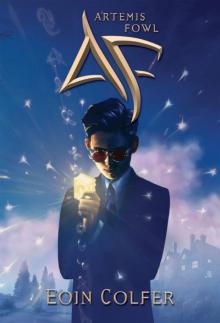 Artemis Fowl
Artemis Fowl Plugged
Plugged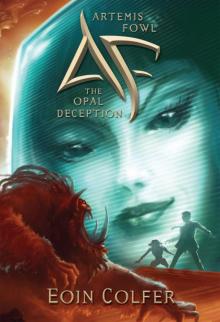 The Opal Deception
The Opal Deception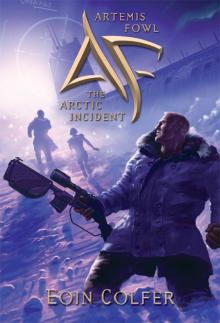 The Arctic Incident
The Arctic Incident The Wish List
The Wish List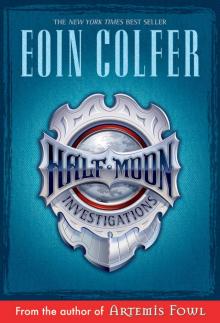 Novel - Half Moon Investigations
Novel - Half Moon Investigations The Supernaturalist
The Supernaturalist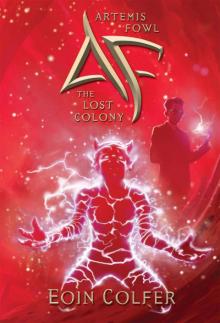 The Lost Colony
The Lost Colony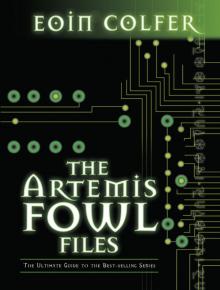 The Artemis Fowl Files
The Artemis Fowl Files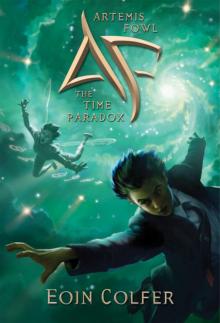 The Time Paradox
The Time Paradox The Atlantis Complex
The Atlantis Complex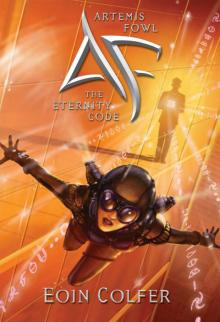 The Eternity Code
The Eternity Code The Time Paradox (Disney)
The Time Paradox (Disney)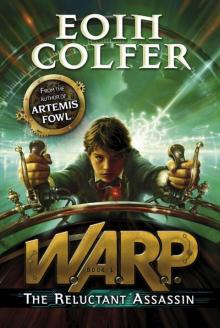 The Reluctant Assassin
The Reluctant Assassin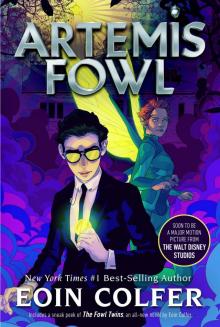 Artemis Fowl (Disney)
Artemis Fowl (Disney) Highfire
Highfire The Last Guardian
The Last Guardian The Lost Colony (Disney)
The Lost Colony (Disney) Screwed: A Novel
Screwed: A Novel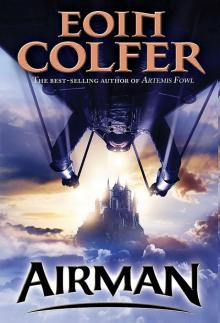 Novel - Airman
Novel - Airman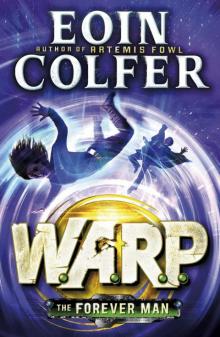 The Forever Man
The Forever Man And Another Thing...
And Another Thing... The Seventh Dwarf
The Seventh Dwarf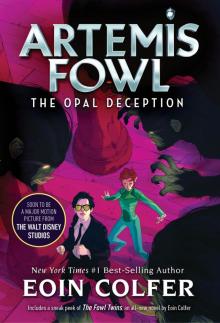 The Opal Deception (Disney)
The Opal Deception (Disney)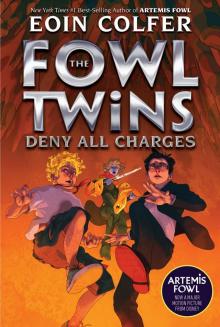 The Fowl Twins Deny All Charges
The Fowl Twins Deny All Charges The Last Guardian (Disney)
The Last Guardian (Disney)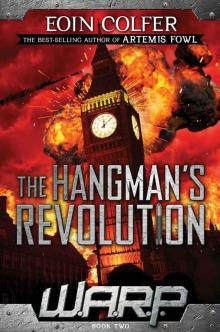 The Hangman's Revolution
The Hangman's Revolution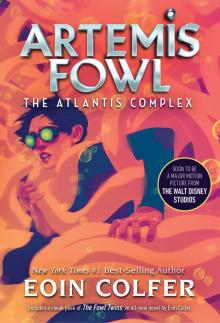 The Atlantis Complex (Disney)
The Atlantis Complex (Disney) The Eternity Code (Disney)
The Eternity Code (Disney) The Fowl Twins
The Fowl Twins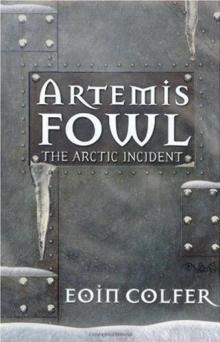 Artemis Fowl. The Arctic Incident af-2
Artemis Fowl. The Arctic Incident af-2 Artemis Fowl and the Atlantis Complex af-7
Artemis Fowl and the Atlantis Complex af-7 Artemis Fowl. The Opal Deception af-4
Artemis Fowl. The Opal Deception af-4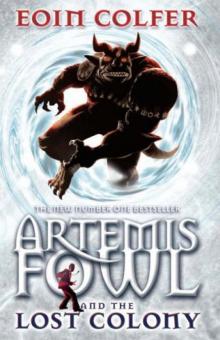 Artemis Fowl. The Lost Colony af-5
Artemis Fowl. The Lost Colony af-5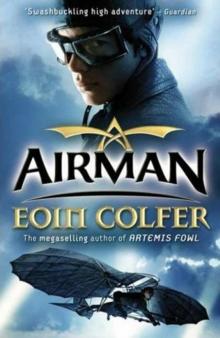 Airman
Airman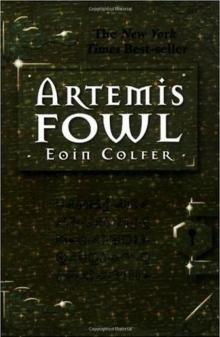 Artemis Fowl af-1
Artemis Fowl af-1 Artemis Fowl: The Eternity Code af-3
Artemis Fowl: The Eternity Code af-3 Screwed dm-2
Screwed dm-2